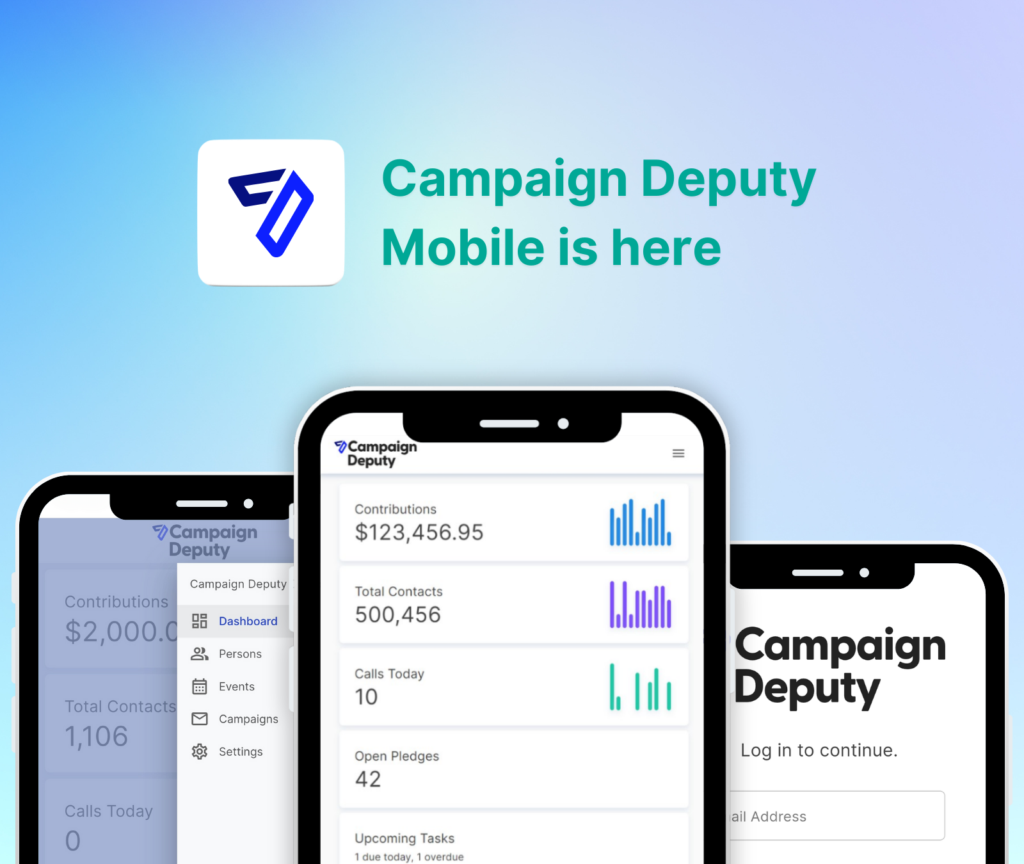Like it or not, phone calls are still the most effective method for reaching out to people.
Email, text messaging, direct messaging on social media, and other forms of outreach are still important – but contacts still have the option of ignoring your messages a lot of the time.
A phone call on the other hand is difficult to ignore, and once you get them on the line you’ve got their undivided attention.
Unfortunately, phone calls are very much a 1-on-1 form of communication. Forcing you to manage your time effectively.
In this article, we’ll look at the 10 call time management tips for increasing your productivity when making phone calls.
Get in touch to see how Campaign Deputy can help you manage your call time more effectively.
Call Time Management Tips
Making more phone calls every day will improve your chances of success.
Use these 10 time management tips for an effective daily call routine:
- Organize contact information
- Properly prepare for calls
- Call the right person
- Track previous calls
- Keep detailed notes
- Block time for calls
- Use voicemail correctly
- Follow up with text messages
- Track your workload
- Separate personal and business calls
It’s important to stay focused when making calls, these tips reduce distraction and help you consistently reach your daily call targets.
Remember, staying on task will make achieving your result of getting more donors to give to your campaign far more likely because you’re focusing on what you can control.
Rather than hoping to reach your goal without a proper call time management system.
Let’s look at each of these tips in more detail.
1. Organize contact information
Before you even start making calls, you need to ensure your contacts are well organized.
The last thing you want is to go searching for details when you’re meant to be on the phone making calls.
Keeping a well-organized, and easily accessible database of contacts will make your life far easier.
The simplest way of doing this is to use a spreadsheet, but these can also become disorganized over time.
So use a platform like Campaign Deputy, which keeps your data organized and stored in a centralized database to avoid sending spreadsheets back and forth with colleagues.
2. Properly prepare for calls
Scrambling around for the necessary information while you’re on a call not only affects your ability to get through the call in a timely manner, but it also gives an impression that you’re unprofessional.
Before jumping on a call, make sure you have everything you need to complete your conversation.
Whether that be information about previous conversations, information about your campaign, or anything else you might need.
Ensuring you’re properly prepared will make your calls run far smoother, meaning you’ll get through more of them in a day.
3. Call the right person
Getting the response, “you have the wrong number”, can be frustrating and time-consuming.
Speaking to the wrong person on a call will significantly increase your time between calls.
Make sure you have the correct details for the person you’re contacting, so each interaction you’re having is productive.
This comes back to keeping your contacts well-organized.
Keeping your database of contacts updated on a regular basis will significantly reduce the issue of calling the wrong number.
4. Track previous calls
Keeping track of if and when you call people is important.
Often you’ll be asked to remove someone from your database, or the person might say they aren’t interested.
When this happens, it’s best to remove them from your list to avoid contacting them again.
As this wastes your time and makes you seem like a spammer which could negatively impact the perception of your brand or cause.
So track your calls to make sure you aren’t wasting time on people who aren’t likely to want to hear from you.
5. Keep detailed notes
This point is closely related to the previous tip of tracking your calls.
Keeping detailed notes in your database specific to a contact helps when you’re skimming through your data and trying to decide who to call next and what was discussed previously.
Understanding where you left off with the person the last time you spoke to them shows you’re properly informed when you speak to them again.
It also helps to move your conversation forward rather than repeating what was discussed the previous time.
The best way to do this is by keeping detailed notes of each call. The time it takes to make the notes will be far less than trying to remember every detail the next time you speak with them.
6. Block time for calls
Trying to squeeze calls into your day between other tasks is guaranteed to reduce the number of calls you’re able to make.
Rather, have a set block or multiple blocks of time throughout your day dedicated to making calls.
This way you aren’t jumping between meetings, emails, calls, and the various other activities you’re required to do throughout your day.
Not only will this allow you to manage your call time more effectively, but it’ll also make the other blocks of work more productive because you’re not splitting your attention having to make calls.
Multitasking isn’t recommended when you’re trying to be productive. Instead, focus on one set of tasks at a time and you’ll see a significant increase in your productivity.
7. Use voicemail correctly
Often you’ll call someone and find you’re left speaking to their voicemail.
This might be because they’re busy and simply aren’t able to answer the phone at the time, or they’re avoiding your call because they don’t recognize your number.
Either way, use the opportunity to leave a friendly but detailed voicemail of the reason for your call.
So when the person wants to know the reason you called, they aren’t annoyed and might even respond positively to your message.
Something you should always do is include a straightforward call-to-action in your voice message.
Asking the person to “call you back” or “email you at” will be a hug time-saver for you.
They’ll appreciate the clarity and often saves you a lot of time, so you don’t have to call them again if they’re truly interested in what you have to say.
8. Follow up with text messages
Apart from phone calls, text messages receive the highest open rate of any other form of communication.
This is because text messages need to be opened to remove the notification from your screen.
Interestingly, not everyone listens to their voicemail messages, so even if you leave one they might not listen to it.
So if the person you’re calling has a mobile number, use the opportunity to send a thoughtful text message explaining the reason for your call and once again, including a straightforward call-to-action.
This is a great, non-intrusive way of getting your message across and will help you effectively manage your call time by reducing the number of call-backs you need to make.
Especially if your text does a great job at generating interest. So always be testing different content in your text messages to increase your chances at success and reducing time spent on repeat calls.
9. Track your workload
If you’re managing your call time in order to increase your daily productivity, then tracking your workload is a must.
Understanding how much work you can complete within a given window of time will allow you to set realistic expectations of yourself.
This way, if you’ve had a particularly slow day, you’ll understand why and attempt to optimize your day a little better moving forward.
This will be impossible to do if you’re not effectively tracking your workload, and uncovering where these inefficiencies are in your day.
10. Separate personal and business calls
Just like we’ve said you should be separating your day into productive blocks of time, rather than trying to multitask your way to effective call time management – the same goes for separating personal and business tasks.
Being distracted by personal calls can derail your productivity and affect your overall efficiency in your work.
It’s also important to keep the business and personal aspects of your life separate to maintain a healthy work/life balance.
Rather than risking an overflow of work frustrations into personal issues which might negatively impact your relationships outside of work.
When you’re making business calls, put your personal device on silent or switch it off altogether.
This way you can effectively manage your call time, but also not allowing work to influence your emotions outside of work hours.
Especially if you’re encountering particularly difficult people during your blocks of work calls.
Conclusion
Call time management is extremely important if you’re trying to achieve measurable success in your campaigns.
Fortunately, there are platforms built specifically to help you achieve these goals.
Over at Campaign Deputy, we’ve spent a lot of time and money researching the most important call time management tools to bring you a platform that does it all.
Try our call time management platform today for free to better manage yours or your staffs call time without using excessive spreadsheets or ineffective business practices.





